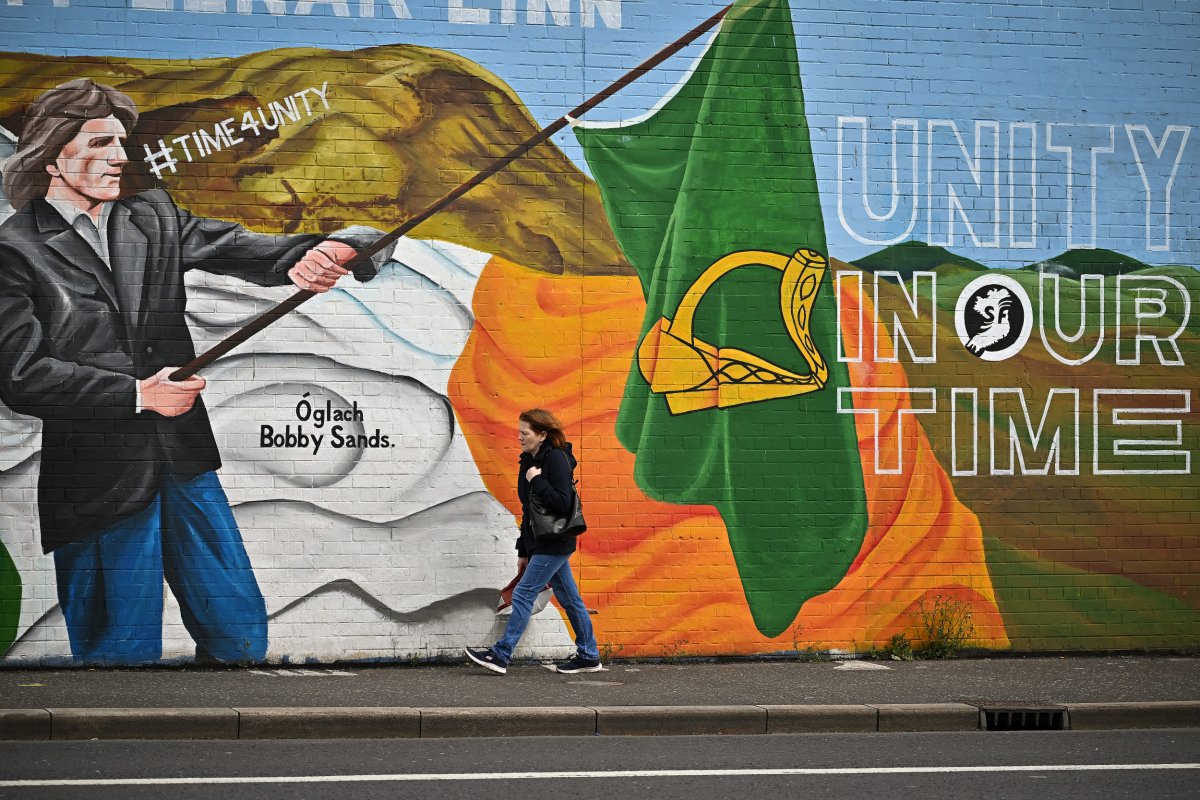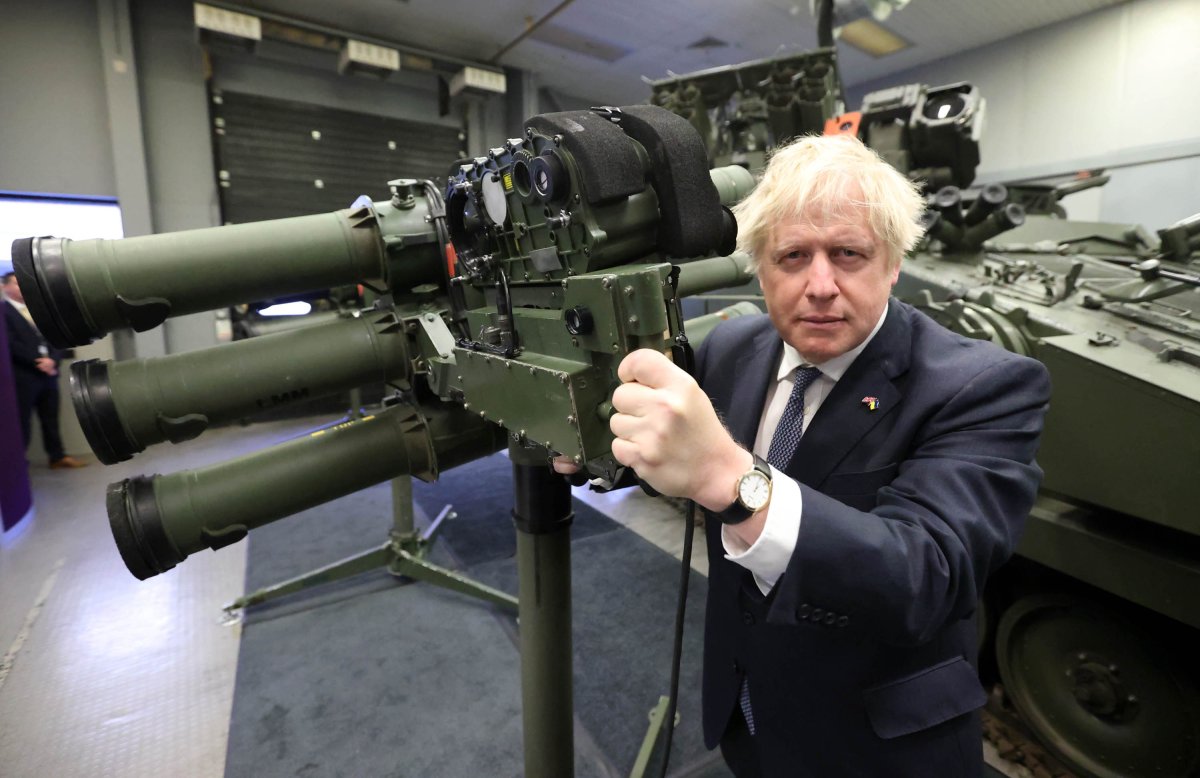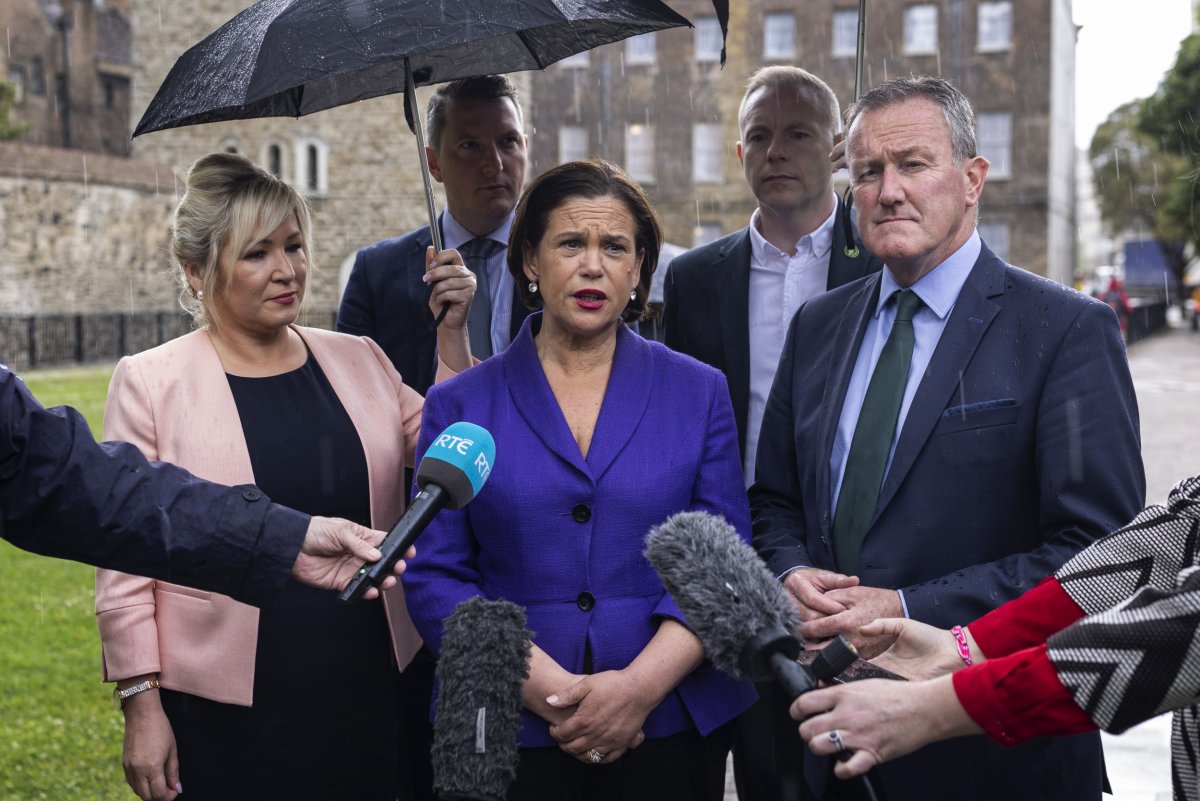Although the electoral victory on May 5 of the largest pro-Irish unity party in British-controlled Northern Ireland may not have been won on a platform promising imminent unification with the independent Republic of Ireland, far-left dissidents with a legacy of armed conflict see it as an opportunity to advance that cause.
It comes at a time when a cost of living crisis has consumed both Catholic and Protestant communities in the disputed territory of nearly two million people, and fears of a return to instability and even conflict have begun to mount.
Sinn Féin, the largest and most prominent nationalist party, managed to channel those economic uncertainties to make election history, marking the first time a nationalist party held more seats than any other party in the Northern Irish parliament. Democratic socialist Sinn Féin is also heavily influential in the Irish parliament, tying with conservative ruling Fianna Fáil, which leads the government in Dublin alongside the center-right Fine Gael and center-left Green Party.
And while many nationalists welcomed a Sinn Féin win in Northern Ireland, dissident republicans have argued that the outcome was more the result of unionist infighting than a vote for the reunification they seek.
Such is the view of Saoradh, a far-left party that the U.K.'s Police Service of Northern Ireland (PSNI) has categorized as having direct ties to the New IRA, perhaps the most active of several groups claiming the legacy of the Irish Republican Army. The group denies that connection, but has emerged as a leading voice for those who still consider paramilitary action an option for ending British rule over Northern Ireland.
"The most recent British election in the Occupied Six Counties indeed witnessed the island's largest Constitutional Nationalist party emerging victorious," Saoradh representative Paddy Gallagher told Newsweek. "But rather than it being a result of their 'hard work' and the people wishing to see this 'real genuine change' they so often speak about, the reality is that a split within unionism is the cause of this."
"They didn't gain any extra seats," he added. "Unionism lost seats to so-called 'middle-ground' parties."
Still, Saoradh sees the election as offering some hope in advancing the establishment of a united socialist state across the island, especially after the disastrous fallout of Brexit, which Gallagher said "could add further to the instability in the Occupied Six Counties and possibly lead to Irish unification."
The United Kingdom's 2020 break with the European Union has led to turmoil in Northern Ireland, with already sensitive customs and border arrangements being thrown into disarray. In an attempt to avoid creating a "hard border" between an EU-excluded Northern Ireland and EU-included Ireland, the U.K. has drawn up a "Northern Ireland Protocol" that would instead introduce checks for U.K. goods at Northern Irish ports, a plan that unionists supportive of closer ties with London have protested by refusing to participate in parliament.
As for Saoradh, Gallagher said "it is our view that the Socialist Republic cannot be won via Stormont nor Leinster House," in reference to the two parliaments in Belfast and Dublin.
Asked if that meant more active resistance measures could be adopted, he said that "principled Republicans have for generations refused to take part in any charade British Election in Ireland, and Saoradh are no different."
"Also," he added, "Republicans have for generations asserted the Irish people's right to freedom and sovereignty through arms, and Saoradh have not condemned anyone for this, nor will we."

Northern Ireland's armed conflict, commonly called The Troubles, officially ended in 1998 with the signing of the Good Friday Agreement. For more than three decades prior, clashes that primarily took place between mostly Catholic republicans and largely Protestant unionists killed thousands on both sides, including security forces and civilians, which bore the brunt of the casualties.
The conflict has far deeper roots in centuries of British settlement in Ireland that began with the Anglo-Norman invasion of the neighboring island in the 12th century. Numerous rebellions were carried out by Irish nationalists over the ensuing centuries. But it was not until after the Easter Uprising of 1916 and the U.K.'s execution of Irish rebel leaders that the first group to call itself the IRA was formed to engage British forces in open warfare, ultimately securing recognition of the Irish Free State, independent but still under the crown and comprised of only 26 of Ireland's 32 countries, in 1922.
In the century since, however, Irish republicans have also been at war with themselves. Dissidents rejected that compromise, just as some groups today refuse to recognize the Good Friday Agreement, even with Sinn Féin now poised to have unprecedented influence in Northern Ireland.
Speaking for Saoradh, Gallagher argued that the Good Friday Agreement brought with it a "triple lock system" through which unionists, the U.K.'s secretary of state and the U.K. government would all have to sign off on any step toward Irish reunification, even if Sinn Féin did succeed in garnering the votes to achieve the landmark motion.
As is the case with the IRA, the position of the true heir to the historic Sinn Féin, which fended off British rule over 26 counties now constituting the Republic of Ireland, is also in dispute. Another party, the Republican Sinn Féin with reported links to the Continuity IRA, considers itself to be the rightful continuation of the Sinn Féin legacy, as opposed to the mainstream faction it refers to as the "Provisional Sinn Féin."
In an article shared with Newsweek by a Republican Sinn Féin spokesperson, the group branded the Northern Irish elections "yet another exercise in futility as the sectarian headcount continues in an institution which has long been dead and should be buried."
Noting the spread of the results, the group said that the outcome "suggests that a good number of nationalists did not vote, a trend that has been seen in elections in recent years." They attributed this to the belief that "many nationalists have become disillusioned by the Provisionals who have achieved nothing for the people but have become part of the British and Free State Establishments."
Republican Sinn Féin also criticized the mainstream Sinn Féin for having a mixed record on supporting "the armed struggle," as the now-leading party walks a careful line in honoring the legacy of the IRA while at the same time distancing itself from its modern iterations.
Also in the fray is the 32 County Sovereignty Movement (32CSM), another dissident group seeking Ireland's reunification through means outside the ballot box. The group has been tied by government agencies, including those in the United States, to the Real IRA, which reportedly merged with like-minded groups a decade ago to form the New IRA.
A spokesperson for the 32CSM told Newsweek that the group "couldn't possibly give any indication of whether there will be a renewed military campaign, as the 32 County Sovereignty Movement are not an armed movement."
"That said," the spokesperson added, "it is our opinion that while not denying any Irish citizens their right to bear arms against a foreign oppressor, that right should not be abused by those using our struggle as cover for personal or criminal ends."
And, when it comes to electoral politics, the spokesperson said that "the last time Ireland had a legitimate vote was in 1919 when the Irish people voted overwhelmingly in support of an Irish Republic consisting of all 32 counties."
"By denying the outcome of that democratic vote Britain acted against international law," the spokesperson added. "From the installation of Stormont they have continued that violation of international law."
In this regard, the spokesperson argued, "while Stormont exists in its current form the only victor will be Britain," which "will do its utmost to keep Stormont in place, protecting its illegal claim over six occupied counties of Ulster."

But Sinn Féin is not the only republican party that backs a border poll in the interest of bringing Northern Ireland out of the British fold, and other far-left elements spoke out against a return to armed conflict.
The Irish Republican Socialist Party, a Marxist-Leninist faction that participated but did not garner any seats in the latest election, launched a grassroots "Yes for Unity" campaign rooted largely in socioeconomic issues.
A spokesperson for the Irish Republican Socialist Party told Newsweek that this campaign was established "to ensure working class mobilisation and working class proactive participation in the Irish Unity campaign to ensure working class socio-economic needs are met in a post partition Ireland."
"It was also a main factor to involve ourselves by standing candidates in the recent 2022 assembly elections to not only maximise the republican/pro-Irish unity voting electorate, to build electoral structures within the communities we are active in," the spokesperson said, "but to also build an electoral mandate to ensure there is a working class socialist voice 'at the table.'"
And despite the group's historic ties to another paramilitary group, the Irish National Liberation Army, the Irish Republican Socialist Party spokesperson said that "the IRSP at this time do not believe armed struggle is a viable alternative in achieving Irish Unity."
"The INLA declared an end to their armed campaign in 2009, and at that time stated they want to pursue their aims exclusively through peaceful and political means," the spokesperson added. "The INLA since then have not stated anything different so we can only assume that is still the case."
Caoimhe Garland, director of communications for the fellow communist Workers' Party of Ireland, from which the Irish Republican Socialist Party split shortly after the parent party then known as Official Sinn Féin declared a ceasefire in 1972, told Newsweek his group and its now-officially defunct Official IRA remained committed to their half-century pact against armed struggle and were "committed to action only in the case of defence or retaliation."
"The north of Ireland and its citizens have suffered immensely as a result of The Troubles and such a move would be a huge step backwards," Garland said.
Garland, like other republican representatives with whom Newsweek spoke, also attributed Sinn Féin's victory to unionist divisions rather than nationalist gains, though he argued the dispute between a number of unionist parties and London's policies "has allowed a more United nationalist SF to drive support for border polls and calls for reunification," as has the "changing demographics of the north" in the form of a growing Catholic population.
In the eyes of the Workers' Party, the goal is to bring political change through mass mobilization rather than insurgency.
"We recognise that the 'national question' remains a central issue and we wish to fully participate in this debate with all sections of our society," Garland said. "Our aim has always been and will remain the unity of the working class and the creation of a 32 county socialist republic on the island of Ireland. It is our belief that this will be achieved through building a mass party of the working class and not through armed conspiracy."

The Continuity IRA, the Real IRA and the New IRA are all considered terrorist organizations by both Ireland and the U.K. London has also categorized several dissident unionist factions as terrorist organizations, including the Loyalist Volunteer Force, Orange Volunteers, Red Hand Commando, Red Hand Defenders and Ulster Freedom Fighters, all bearing links to the historic Ulster Volunteer Force and Ulster Defence Association that served as vanguards of the unionist paramilitary front of The Troubles and also remain on the U.K. terrorism list.
And though uncertainty in Northern Ireland has prompted fears of renewed unrest, the PSNI actually lowered the "Terrorist threat level" from "severe" to "substantial" in March, changing the assessment of incidents from "highly likely" to "likely." The U.K. police force in Northern Ireland told Newsweek it "welcomed" this development.
"This is significant as it signals a success in the long-term efforts made by police officers and staff, our partners, and in particular the community," PSNI said in a statement, "in achieving the kind of society that we all want and deserve."
Security-related deaths, as well as shootings, bombings and paramilitary attacks, have also decreased over the past year.
But, in the wake of the recent elections and the statements of the dissident groups looking to seize on a chance to push for Irish unity, PSNI said it remained vigilant.
"While we have achieved success in recent years, preventing attacks, investigating and pursuing groups including the New IRA, and putting violent criminals before the courts," PSNI said, "unfortunately, there remains a small group of people within our society who are intent on causing harm and dragging Northern Ireland back to the past."
"Our work will continue unabated as we work alongside the local community and our partner agencies to pursue those individuals involved in criminality and bringing them before the courts," the police service added. "Our overarching priority is to deliver a visible, accessible and responsive community focused policing service to keep people safe."
Sinn Féin, for its part, remains committed to achieving Irish unity, along with other nationalist goals such as granting the Irish language equal status to English, through democratic means, even as the rival Democratic Unionist Party continues to block parliamentary actions until the Northern Ireland Protocol dispute was settled.
Reports indicate, however, that Sinn Féin has held consultations with rival republican groups such as Saoradh and the Irish Republican Socialist Party in a bid to set the groundwork for a border poll, something Sinn Féin President Mary Lou McDonald could happen within the next five years.
Newsweek has contacted Sinn Féin and the U.K. Home Office for comment.
Uncommon Knowledge
Newsweek is committed to challenging conventional wisdom and finding connections in the search for common ground.
Newsweek is committed to challenging conventional wisdom and finding connections in the search for common ground.
About the writer
Based in his hometown of Staten Island, New York City, Tom O'Connor is an award-winning Senior Writer of Foreign Policy ... Read more
To read how Newsweek uses AI as a newsroom tool, Click here.






